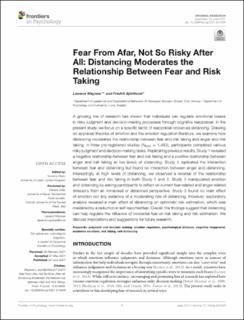Fear from Afar, Not So Risky After All: Distancing Moderates the Relationship Between Fear and Risk Taking
Peer reviewed, Journal article
Published version
Permanent lenke
https://hdl.handle.net/11250/3012038Utgivelsesdato
2021Metadata
Vis full innførselSamlinger
Sammendrag
A growing line of research has shown that individuals can regulate emotional biases in risky judgment and decision-making processes through cognitive reappraisal. In the present study, we focus on a specific tactic of reappraisal known as distancing. Drawing on appraisal theories of emotion and the emotion regulation literature, we examine how distancing moderates the relationship between fear and risk taking and anger and risk taking. In three pre-registered studies (Ntotal = 1,483), participants completed various risky judgment and decision-making tasks. Replicating previous results, Study 1 revealed a negative relationship between fear and risk taking and a positive relationship between anger and risk taking at low levels of distancing. Study 2 replicated the interaction between fear and distancing but found no interaction between anger and distancing. Interestingly, at high levels of distancing, we observed a reversal of the relationship between fear and risk taking in both Study 1 and 2. Study 3 manipulated emotion and distancing by asking participants to reflect on current fear-related and anger-related stressors from an immersed or distanced perspective. Study 3 found no main effect of emotion nor any evidence of a moderating role of distancing. However, exploratory analysis revealed a main effect of distancing on optimistic risk estimation, which was mediated by a reduction in self-reported fear. Overall, the findings suggest that distancing can help regulate the influence of incidental fear on risk taking and risk estimation. We discuss implications and suggestions for future research.

